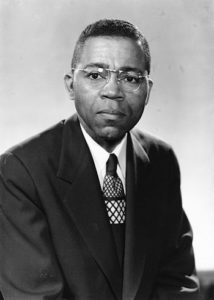
William Fontaine
This date marks the birth of William T.V. Fontaine, a Black educator and philosopher, in 1909.
He was the grandson of a slave and the second son of 13 children of a Pennsylvania steelworker. In 1930, Fontaine graduated cum laude with a BA from Lincoln University, where he was class president and a member of Omega Psi Phi Fraternity.
He attended graduate school at Harvard University and the Universities of Chicago and Pennsylvania. He received his doctorate of philosophy from Penn in 1936. His thesis was on the "Concept of Fortune in Boethius and Giordana Bruno."
A World War II enlisted veteran, a Black man, he joined the Penn faculty as a lecturer in philosophy in 1947 and was promoted to assistant professor two years later. Fontaine's interests and connections stretched beyond the United States. In 1959, he attended Pope John XVIII's address to "Negro" intellectuals, where they were blessed for their efforts to promote black culture.
In 1960, he went to Lagos, Nigeria, where he helped celebrate his classmate, Nnamdi Azikiwe's inauguration as governor-general and commander-in-chief of the Federation of Nigeria. Two years later, he represented the executive committee of the American Society of African Culture at a conference on socialism called by Senegal President Leopold Senghor in Dakar. His intellectual endeavors matched his international involvement. In his 1967 book, "Reflections on Segregation, Desegregation, Power, and Morals," Fontaine sought to "anatomize" segregation, or as he says in the preface: "bust it down to the bare guts."
Writing in the 1960s, during the height of the 20th century American Civil Rights Movement and the resurgence of Black Nationalism, Fontaine said that demonstrations have taught Americans that "It is no longer necessary to wait upon impersonal forces of history--world wars and economic depressions--to precipitate crises forcing recognition of the claims of underprivileged peoples." Demonstrations enable the underprivileged themselves to produce historic crises containing, among others, "a pervasive, inescapable moral challenge to the whole of society."
Fontaine's "Reflections," while radical in its discussion on race relations and groundbreaking in its demystifying language as a rhetoric of power relations, did have conservative overtones in some passages. He called "Black Power" a "contrary program." He maintained that the Student Nonviolent Coordinating Committee's (SNCC) action toward Black power "raises the suspicion that they never understood segregation and desegregation and are just as confused now." He also criticized white sympathizers who left the Civil Rights Movement during increased Black-white polarization only to join with "backlash segregationists." They "cannot be aware of the consequences of entrusting their governments to racial extremists."
Fontaine considered philosophy more than a "strictly academic" field. For him, it served as the "foundation for human society." He believed that "all social problems are moral problems, ultimately."
William Fontaine was the first Black to become a fully affiliated professor at the University of Pennsylvania in 1963. He died in 1968. Two years after his death, the university established the Fontaine Fellowships in his honor.
Encyclopedia of African American Culture and History
Volume 1, ISBN #0-02-897345-3
Jack Salzman, David Lionel Smith, Cornel West